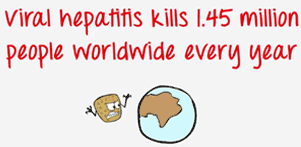Viral hepatitis is a global health problem affecting hundreds of millions of people worldwide. An estimated 1.45 million people die annually from all types of viral hepatitis, mostly from liver disease and cancer caused by these infections.
Viral hepatitis is caused by 5 distinct hepatitis viruses. These viruses are transmitted through contaminated water and food, as well as by contact with blood or bodily fluids, through unsafe injections or transfusions. Infection also occurs from a mother to a child, or through sexual contact. Infection through all these routes of transmission can be prevented through proven and effective interventions. It is important for everyone to be aware of hepatitis and to learn how they can protect themselves from being infected.
Every day, thousands of people are newly infected because they lack access to information and services for prevention and treatment. Many of these people are unaware of their infection until diagnosed and have the potential to transmit the viruses to others. This year, WHO and its partners are urging policy-makers, health workers and the public to take action to prevent infection and death from hepatitis.
The Eastern Mediterranean Region has some of the highest rates of hepatitis in the world. Around 17 million people suffer from chronic hepatitis C. Every year, an estimated 4.3 million people are infected with hepatitis B and 800 000 people with hepatitis C.
Related links
World Hepatitis Day in Egypt focuses on hepatitis B and C prevention
WHO calls for urgent action to curb hepatitis
Campaign materials
Multimedia
Viral hepatitis in Egypt: challenges and response (YouTube) | Download










